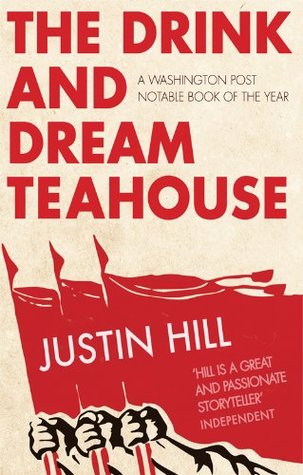Adventures in Bookland: The Drink and Dream Teahouse by Justin Hill

There’s precious few authors who don’t have a pile of failed novels sitting at the bottom of the cupboard or hidden on a hard drive. There’s even fewer whose first completed novel was written when still young. Justin Hill manages both of these and he adds a third: writing convincingly and moving about the old while still a young man himself. To really make this debut novel stand out, Hill does all this in the context of turn of the millennium China: but not the China of newly minted millionaires and communist capitalism but one of the semi-forgotten towns of the northern hinterlands where the winter blows in from over the Mongolian plain, bitter and long. It’s an extraordinary window into a China that very few people outside China know, a hard-scrabble land that, despite its atrocities, communist rule probably improved, leaving the people there caught in the middle of the pivot to consumer communist capitalism made by the Party bigwigs in far away Beijing.
It’s a quite brilliant portrayal of a group of characters struggling to come to terms with a China that has pretty comprehensively demolished its past – Mao ranks as one of the worse cultural vandals in history – but is also busy overturning the few certainties bequeathed by the communist era. For the elderly, it’s a time for some to attempt to come to grips with the past and in particular their parts in the Cultural Revolution. For the young, it’s an attempt to find a road between the new Party goal of getting rich and dealing with the aftermath of Tiananmen Square. It’s a portrayal of the oldest continuously civilised society on earth trying to understand how it could have systematically destroyed that heritage and picking up the pieces of what is left.
All of this is done in the context of the most human of stories: of Da Shan, returning to his old home after getting rich in the big city but still carrying the burden of his part in the great betrayal following Tiananmen Square; of Liu Bei, his one-time lover, eking out her living in the Drink and Dream Teahouse of the title – a brothel frequented by members of the local Party hierarchy. It’s the story of their parents and the other old stagers, still scarred by memories of famine and want and political destruction. It’s a story of a society still deeply scarred by the brutality visited upon it, a brutality that plays out in the story in a couple of harsh scenes of sexual violence that, while integral to the story, might make the book unpalatable for certain readers.
It’s not a story with happy endings but then, the story of China is no fairytale: they do not all live happily ever after, as recent events in Hong Kong and Wuhan show. Read it for an insight into what China was becoming twenty years ago and set it against what the Party lets us see of China now: the true story is very different from what is portrayed in the media. Read it also for a prose style that makes an extraordinary attempt to convey, in English, something of the rhythms and cadences of Chinese.
The Drink and Dream Teahouse would be an outstanding novel for any writer: it’s a truly extraordinary novel for a first-time author.
0 Comments